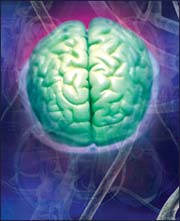Articles and reports from the Life Sciences and chemistry area deal with applied and basic research into modern biology, chemistry and human medicine.
Valuable information can be found on a range of life sciences fields including bacteriology, biochemistry, bionics, bioinformatics, biophysics, biotechnology, genetics, geobotany, human biology, marine biology, microbiology, molecular biology, cellular biology, zoology, bioinorganic chemistry, microchemistry and environmental chemistry.

Bacteria are an indiscriminate lot. While most organisms tend to pass their genes on to the next generation of their own species, bacteria often exchange genetic material with totally unrelated species – a process called lateral gene transfer.
That is why skeptics doubted that researchers could ever hope to work out the evolutionary history of bacteria. But now, thanks to the availability of sequenced genomes for groups of related bacteria, and a new analytical approach, researchers at the

How do people subjected to the endless dark days of winter in the far northern latitudes maintain normal daily rhythms? Though many might feel like hibernating, a highly regulated internal system keeps such impractical yearnings in check. From fruit flies to humans, nearly every living organism depends on an internal clock to regulate basic biological cycles such as sleep patterns, metabolism, and body temperature. And that clock runs on similar molecular mechanisms.
Specific clusters of ne

Neurobiologists at Duke University Medical Center have found the strongest evidence yet that monkeys show the same keen “social reflexes” that humans do — shifting their attention in response to the direction of gaze of another individual. The researchers said their findings mean that monkeys can provide a critically important animal model of how the brain controls what humans pay attention to in social situations.
Such a model would enable scientists to better understand how processing of

In an attempt to find new regulators of the immune system, a team of researchers at Rigel Pharmaceuticals, Inc. have created a successful method for discovering molecules that are involved in signalling pathways. As published this week in the Journal of Biology, the team conducted a functional genome-wide screen and discovered novel modulators of T-cell receptor signalling that could aid in the development of drugs that target the immune response.
T cells are an integral part of the immune r

Intervention in the process whereby genes are turned “on” or “off” has been demonstrated by scientists at the Hebrew University-Hadassah Medical School. The work offers promise for future genetic treatment to control undesirable tissue growth, such as in cancer.
The experimental work of the group is described in a recent article in the journal, Nature Genetics. The researchers succeeded in showing how manipulation of the methylation process in animals can turn genes which are normally inacti

The meaning and nature of change is a question that has fascinated some of the world’s greatest minds since long before the birth of Christ. Today, legions of philosophers and hosts of cognitive scientists continue to work to resolve what may be one of the world’s greatest paradoxes: How is it that change and constancy coexist in the world and in the human mind? Binghamton University Professor Eric Dietrich is sure of at least one thing. Our creativity, and likely our very survival, depends on the f